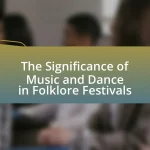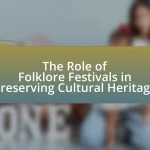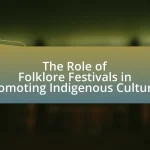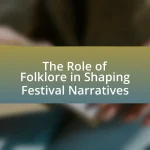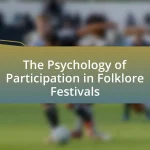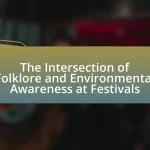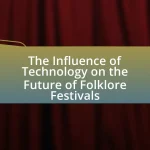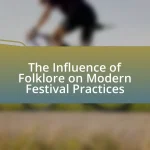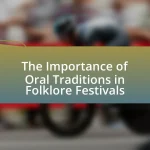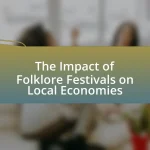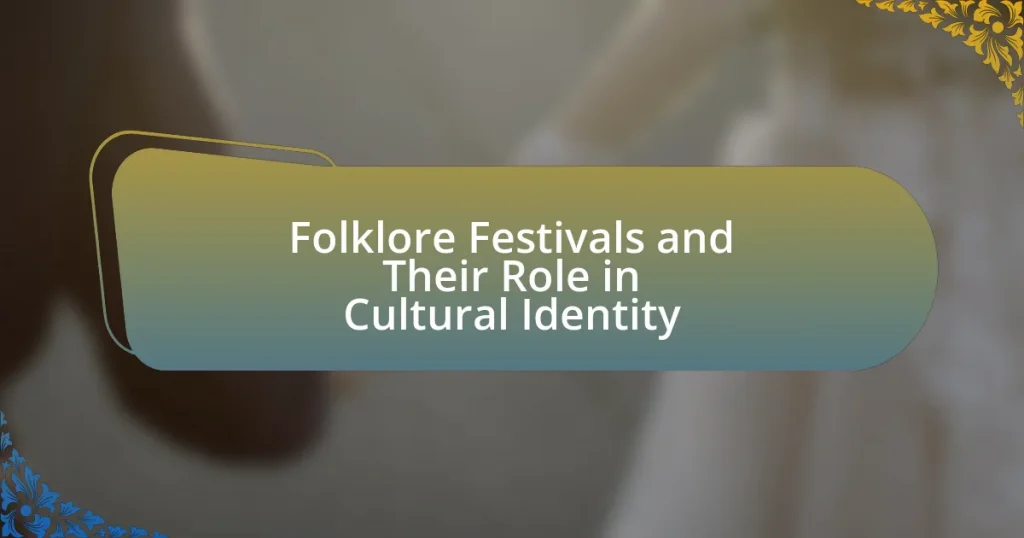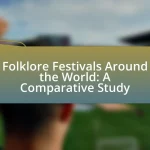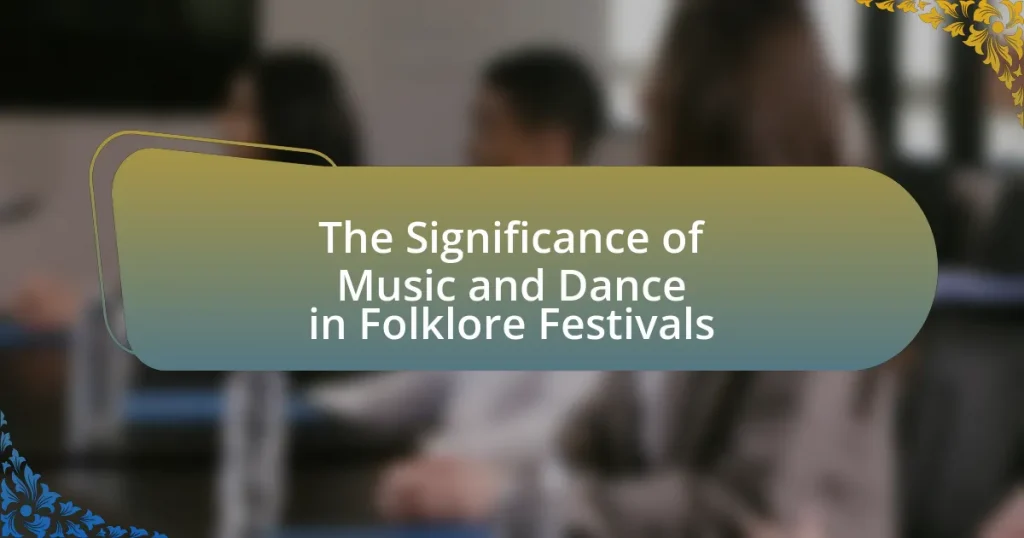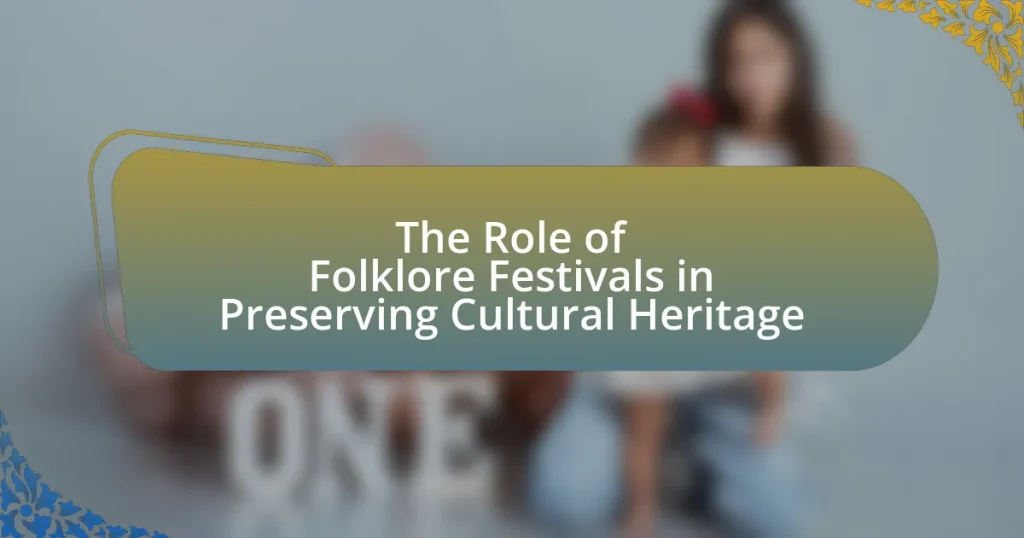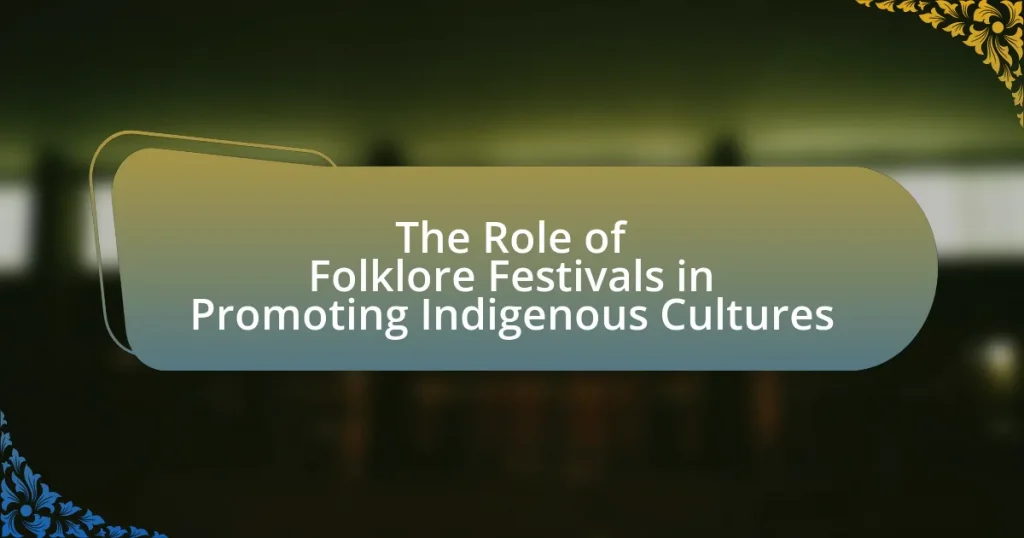Folklore festivals are cultural events that celebrate and showcase the traditional customs, music, dance, and arts of specific communities or regions. These festivals play a crucial role in preserving cultural heritage, fostering community pride, and reinforcing cultural identity through performances, storytelling, and exhibitions. The article explores the unique characteristics of folklore festivals, their historical significance, and their evolution over time, while also addressing the challenges they face in modern society, such as globalization and cultural appropriation. Additionally, it highlights the importance of community engagement and education in sustaining these festivals and promoting intergenerational relationships.
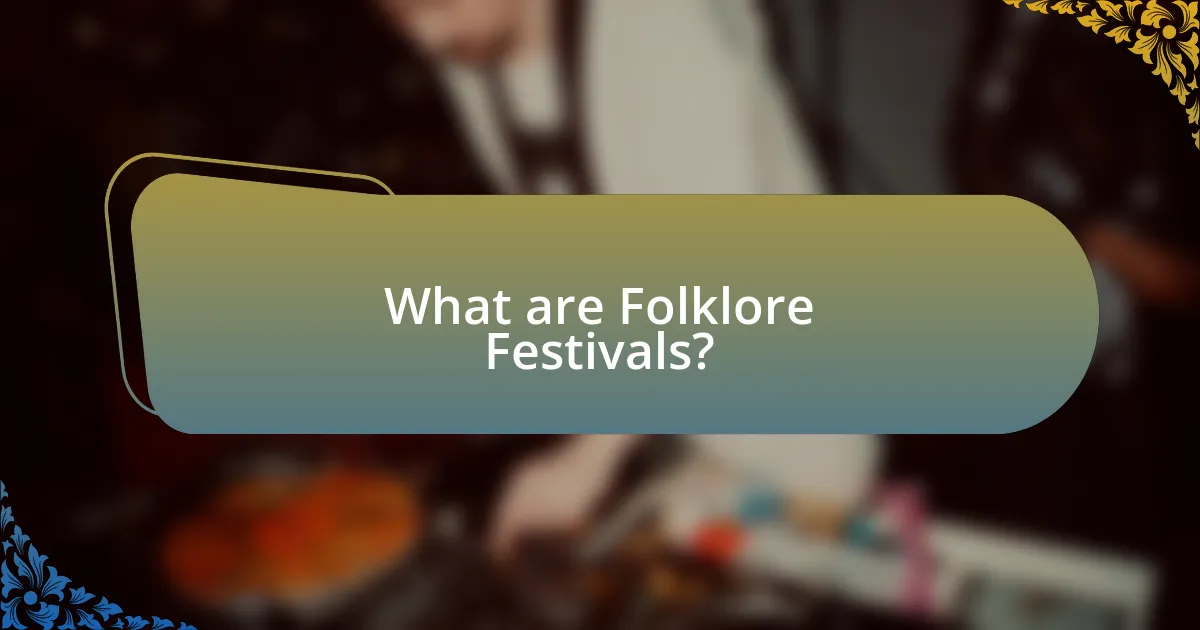
What are Folklore Festivals?
Folklore festivals are cultural events that celebrate and showcase the traditional customs, music, dance, and arts of a specific community or region. These festivals often feature performances, storytelling, and exhibitions that reflect the unique heritage and identity of the people involved. For instance, the National Folk Festival in the United States highlights diverse cultural expressions from various ethnic groups, emphasizing the importance of preserving and promoting cultural traditions. Such events play a crucial role in fostering community pride and continuity of cultural practices across generations.
How do Folklore Festivals differ from other cultural celebrations?
Folklore festivals differ from other cultural celebrations primarily in their focus on traditional practices, stories, and art forms that are specific to a community’s heritage. These festivals emphasize the preservation and presentation of local folklore, including music, dance, crafts, and oral traditions, which serve to reinforce cultural identity and continuity. For instance, the National Folk Festival in the United States showcases diverse folk traditions, highlighting the importance of community narratives and historical context, unlike broader cultural celebrations that may prioritize contemporary themes or global influences. This distinct emphasis on heritage and local customs makes folklore festivals unique in their role of fostering cultural pride and intergenerational connections.
What elements define a Folklore Festival?
A Folklore Festival is defined by elements such as traditional music, dance, crafts, storytelling, and food that reflect the cultural heritage of a community. These festivals serve as platforms for the preservation and celebration of local customs and practices, often featuring performances by local artists and artisans who showcase their skills. For example, the Smithsonian Folklife Festival in Washington, D.C., highlights diverse cultural expressions through workshops and demonstrations, reinforcing the importance of cultural identity and community engagement.
Why are traditional practices important in Folklore Festivals?
Traditional practices are important in folklore festivals because they serve as a means of preserving cultural heritage and fostering community identity. These practices, such as traditional music, dance, and storytelling, connect individuals to their historical roots and promote a sense of belonging. For instance, the celebration of specific rituals or performances during festivals often reflects the unique customs and values of a community, reinforcing cultural continuity. Research indicates that participation in such festivals enhances social cohesion and cultural pride, as evidenced by studies showing increased community engagement and identity reinforcement among participants.
What historical significance do Folklore Festivals hold?
Folklore festivals hold historical significance as they serve as vital expressions of cultural heritage and community identity. These festivals often originate from traditional practices, rituals, and storytelling that have been passed down through generations, reflecting the values, beliefs, and customs of a particular group. For instance, the celebration of harvest festivals in various cultures not only marks agricultural cycles but also reinforces communal bonds and shared history. Additionally, folklore festivals contribute to the preservation of endangered cultural practices, as seen in events like the International Folklore Festival in Neuchâtel, Switzerland, which showcases diverse cultural traditions and promotes intercultural dialogue. This historical role underscores the importance of folklore festivals in maintaining cultural continuity and fostering a sense of belonging within communities.
How have Folklore Festivals evolved over time?
Folklore festivals have evolved from localized community gatherings celebrating traditional customs to large-scale events that attract international audiences and promote cultural exchange. Initially, these festivals served as a means for communities to preserve and showcase their unique traditions, often featuring local music, dance, and crafts. Over time, globalization and technological advancements have transformed these festivals, incorporating diverse cultural elements and modern entertainment forms, thus broadening their appeal. For instance, the International Folklore Festival in Neuchâtel, Switzerland, established in 1967, now features performers from over 30 countries, highlighting the shift towards a more inclusive and global perspective on folklore. This evolution reflects the changing dynamics of cultural identity, where folklore festivals now serve not only as a means of preservation but also as platforms for intercultural dialogue and understanding.
What role did Folklore Festivals play in community bonding historically?
Folklore festivals historically played a crucial role in community bonding by serving as platforms for cultural expression and social interaction. These festivals facilitated the sharing of traditional music, dance, and storytelling, which reinforced communal ties and fostered a sense of belonging among participants. For instance, in many cultures, annual folklore festivals became significant events where families and neighbors gathered, strengthening relationships and creating shared memories. Historical records indicate that such gatherings often included rituals and communal activities that promoted cooperation and solidarity, further enhancing community cohesion.
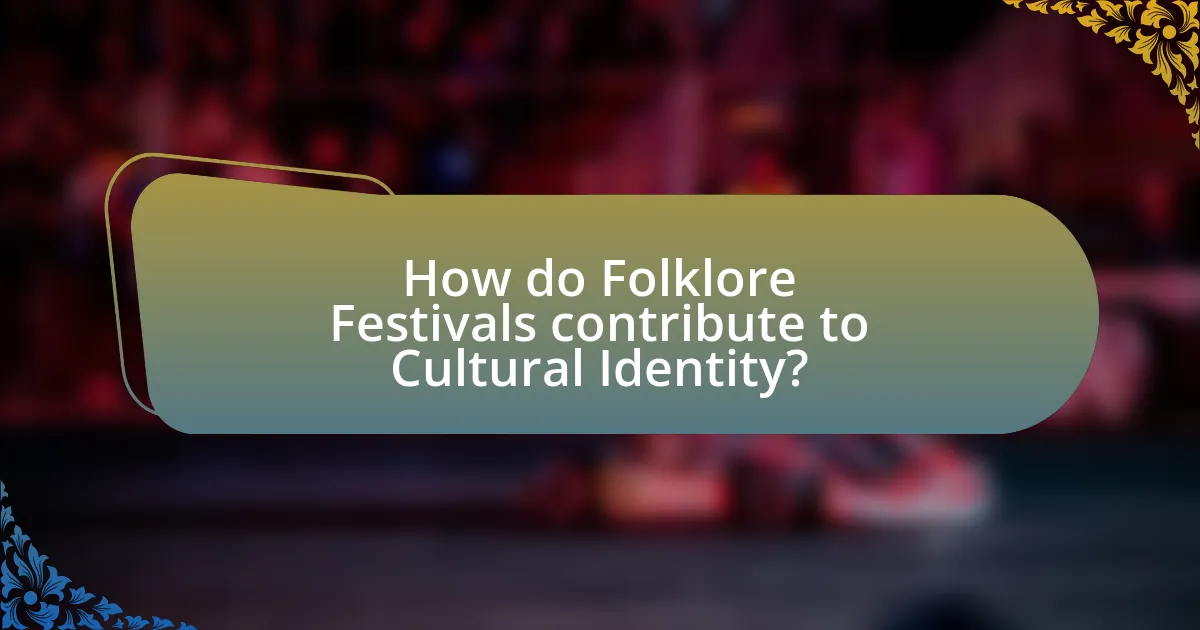
How do Folklore Festivals contribute to Cultural Identity?
Folklore festivals contribute to cultural identity by serving as platforms for the expression and preservation of traditional customs, practices, and narratives. These festivals showcase local art forms, music, dance, and storytelling, which are integral to a community’s heritage. For instance, the annual National Folk Festival in the United States highlights diverse cultural expressions, reinforcing the significance of regional identities and fostering a sense of belonging among participants. By engaging communities in these celebrations, folklore festivals not only promote cultural continuity but also educate younger generations about their roots, thereby solidifying cultural identity over time.
In what ways do Folklore Festivals express cultural heritage?
Folklore festivals express cultural heritage through the preservation and celebration of traditional practices, music, dance, and crafts. These festivals serve as platforms for communities to showcase their unique cultural identities, often featuring local artisans, performers, and storytellers who share their ancestral knowledge and skills. For instance, events like the National Folk Festival in the United States highlight diverse cultural expressions, reinforcing community bonds and fostering intergenerational transmission of traditions. By engaging participants and audiences in these cultural practices, folklore festivals play a crucial role in maintaining and revitalizing cultural heritage, ensuring its relevance in contemporary society.
How do storytelling and performances shape cultural identity at these festivals?
Storytelling and performances at folklore festivals shape cultural identity by preserving and transmitting traditions, values, and collective memories of communities. These artistic expressions serve as a medium through which cultural narratives are shared, allowing participants and audiences to connect with their heritage. For instance, research indicates that storytelling fosters a sense of belonging and continuity, as it often reflects historical events and social norms specific to a culture. Additionally, performances, such as traditional dances and music, reinforce cultural symbols and practices, creating a shared experience that strengthens community ties. This dynamic interplay between storytelling and performances not only celebrates cultural uniqueness but also educates younger generations, ensuring the survival of cultural identity over time.
What symbols and motifs are commonly represented in Folklore Festivals?
Folklore festivals commonly represent symbols and motifs such as traditional costumes, folk music, dance, agricultural themes, and mythological figures. Traditional costumes often reflect the cultural heritage of a community, showcasing unique patterns and colors that signify regional identity. Folk music and dance serve as expressions of cultural narratives and communal values, often incorporating instruments and styles specific to the area. Agricultural themes, such as harvest celebrations, highlight the importance of farming and seasonal cycles in local traditions. Mythological figures, often derived from local legends, symbolize the community’s beliefs and values, reinforcing cultural identity. These elements collectively contribute to the preservation and celebration of cultural heritage during folklore festivals.
Why are Folklore Festivals important for community cohesion?
Folklore festivals are important for community cohesion because they foster a sense of belonging and shared identity among participants. These events bring together diverse groups within a community, allowing individuals to celebrate their cultural heritage and traditions collectively. For instance, studies have shown that participation in local folklore festivals can enhance social ties and promote mutual understanding, as evidenced by the increased community engagement and collaboration observed in towns that host such events. By providing a platform for storytelling, music, dance, and traditional crafts, folklore festivals create opportunities for interaction and dialogue, reinforcing social bonds and cultural pride among community members.
How do these festivals foster a sense of belonging among participants?
Folklore festivals foster a sense of belonging among participants by creating a shared cultural experience that reinforces community ties. These events often feature traditional music, dance, and storytelling, which serve as a medium for participants to connect with their heritage and each other. For instance, studies have shown that communal activities during festivals, such as group performances and collaborative crafts, enhance social cohesion and collective identity. Additionally, the celebration of local customs and traditions during these festivals allows individuals to feel part of a larger narrative, strengthening their emotional connection to the community and its cultural identity.
What impact do Folklore Festivals have on intergenerational relationships?
Folklore festivals positively impact intergenerational relationships by fostering shared cultural experiences and promoting dialogue between different age groups. These festivals serve as platforms where younger and older generations can engage in traditional practices, storytelling, and performances, thereby enhancing mutual understanding and respect. Research indicates that participation in such cultural events strengthens familial bonds and community ties, as evidenced by a study conducted by the University of California, which found that families attending folklore festivals reported improved communication and emotional connections. This interactivity not only preserves cultural heritage but also encourages the transfer of knowledge and values across generations, reinforcing the importance of cultural identity.
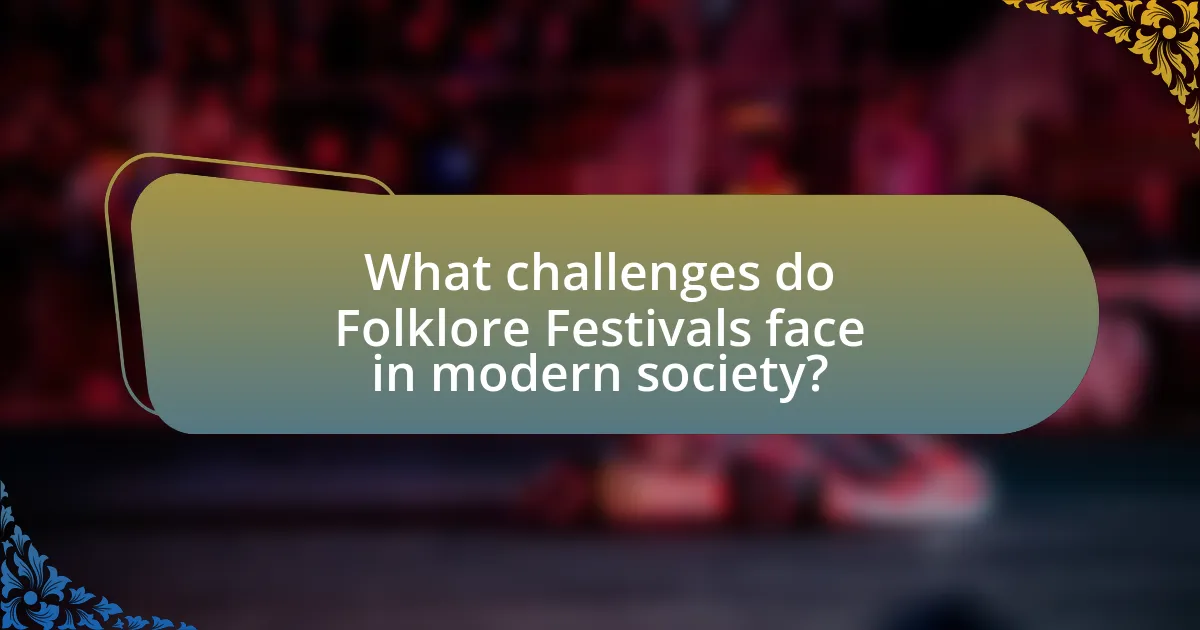
What challenges do Folklore Festivals face in modern society?
Folklore festivals face significant challenges in modern society, primarily due to globalization, commercialization, and changing cultural values. Globalization often leads to the dilution of traditional practices as cultures blend, making it difficult for folklore festivals to maintain their authenticity. Commercialization can overshadow the original intent of these festivals, transforming them into profit-driven events rather than genuine cultural celebrations. Additionally, changing cultural values, particularly among younger generations, may result in decreased interest in traditional folklore, threatening the sustainability of these festivals. For instance, a study by the International Council for Traditional Music highlights that many folklore festivals struggle to attract younger audiences who prefer contemporary entertainment options over traditional cultural expressions.
How is globalization affecting Folklore Festivals?
Globalization is significantly affecting folklore festivals by promoting cultural exchange and commercialization. As cultures interact more frequently due to globalization, folklore festivals increasingly incorporate diverse elements from various traditions, leading to hybrid forms of cultural expression. For instance, festivals may feature international artists alongside local performers, which can enhance the festival’s appeal but may dilute traditional practices. Research indicates that over 70% of folklore festivals now include global influences, reflecting a shift towards a more inclusive yet less distinct cultural representation. This trend raises concerns about the preservation of authentic cultural identities amidst the growing influence of global culture.
What are the risks of cultural appropriation in Folklore Festivals?
Cultural appropriation in folklore festivals poses significant risks, including the commodification of cultural elements and the erasure of their original meanings. When dominant cultures adopt aspects of marginalized cultures without permission or understanding, it can lead to misrepresentation and reinforce stereotypes. For instance, the use of traditional attire or rituals as mere entertainment can strip these practices of their cultural significance, reducing them to superficial displays. This not only disrespects the originating culture but can also lead to economic exploitation, where profits from cultural expressions benefit outsiders rather than the communities that created them. Additionally, cultural appropriation can foster resentment and alienation among the original culture’s members, undermining their identity and heritage.
How can festivals adapt to changing societal values while preserving tradition?
Festivals can adapt to changing societal values while preserving tradition by incorporating contemporary themes and practices that resonate with current audiences. For instance, many festivals now include discussions on social issues such as sustainability and inclusivity, which reflect modern values while maintaining traditional elements like music, dance, and storytelling. This approach allows festivals to remain relevant and engaging, ensuring that they attract diverse participants and audiences. Historical examples include the adaptation of traditional harvest festivals to include local organic farming practices, thereby honoring agricultural heritage while addressing contemporary environmental concerns.
What strategies can be employed to sustain Folklore Festivals?
To sustain Folklore Festivals, community engagement and collaboration with local stakeholders are essential strategies. Engaging local communities fosters a sense of ownership and pride, which can lead to increased participation and support. For instance, festivals that involve local artisans, musicians, and cultural groups not only enhance authenticity but also ensure that the festival reflects the community’s cultural identity. Additionally, securing funding through partnerships with local businesses and government grants can provide the necessary financial support for ongoing operations. Research indicates that festivals with strong local partnerships tend to have higher attendance and community involvement, as seen in the case of the National Folk Festival in Australia, which successfully integrates local cultural expressions and attracts significant visitor numbers.
How can community engagement enhance the longevity of Folklore Festivals?
Community engagement can enhance the longevity of Folklore Festivals by fostering a sense of ownership and participation among local residents. When community members actively contribute to the planning, organization, and execution of these festivals, they develop a deeper connection to their cultural heritage, which encourages ongoing support and attendance. Research indicates that festivals with high levels of community involvement see increased visitor numbers and sustained interest over time, as evidenced by the success of events like the National Folk Festival in Australia, which relies heavily on local volunteers and cultural groups to maintain its relevance and appeal. This collaborative approach not only preserves traditional practices but also adapts them to contemporary contexts, ensuring that Folklore Festivals remain vibrant and meaningful for future generations.
What role does education play in promoting Folklore Festivals?
Education plays a crucial role in promoting Folklore Festivals by fostering awareness and appreciation of cultural heritage among individuals. Educational programs, such as workshops and school curricula, often include the study of local traditions, stories, and practices, which directly enhances community engagement in folklore events. For instance, research conducted by the National Endowment for the Arts indicates that educational initiatives that incorporate folk arts can significantly increase participation in cultural festivals, thereby preserving and revitalizing local traditions. This connection between education and folklore festivals not only enriches cultural identity but also encourages intergenerational transmission of knowledge and practices.
What are best practices for organizing a successful Folklore Festival?
To organize a successful Folklore Festival, it is essential to engage the community, curate authentic cultural content, and ensure effective logistics. Engaging the community fosters participation and support, which is crucial for attendance and volunteer involvement. Curating authentic cultural content, such as traditional music, dance, and crafts, preserves the cultural identity and attracts audiences interested in genuine experiences. Effective logistics, including venue selection, scheduling, and safety measures, ensure a smooth event flow and enhance the overall experience for attendees. These practices are supported by successful examples, such as the Smithsonian Folklife Festival, which emphasizes community involvement and cultural authenticity, drawing large crowds and fostering cultural appreciation.
